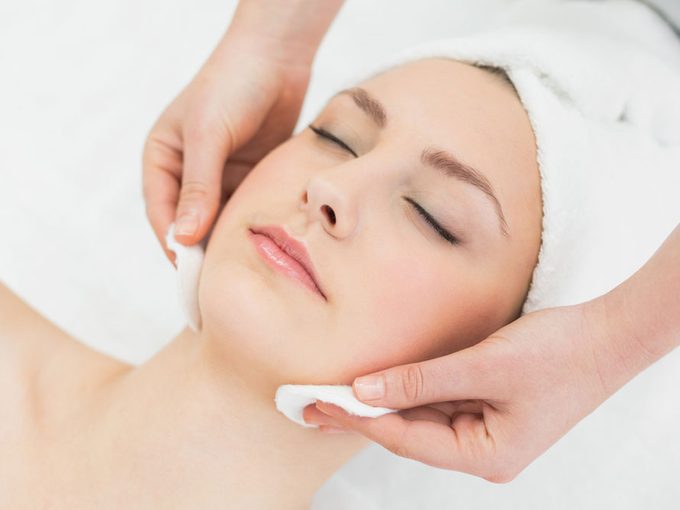Oncology Esthetics: How Spas Can Help Cancer Patients
Cancer treatments can make skin hypersensitive and extra dry. Now, spas are branching out to include oncology esthetics, specifically for those undergoing treatment for cancer

Source: Best Health magazine, October 2015
For Karen Bellavance, a 46-year-old hairstylist in Vancouver, it began with a dry spot on her face that wouldn’t heal. Tests revealed it was skin cancer, the result of too many carefree years in the sun. The good news was it was very treatable via topical chemotherapy, but the bad news was the process wasn’t be pretty. ‘My entire face was like a giant scab,’ she says.
Since Bellavance worked throughout her treatment ‘ without makeup and standing in front of a mirror all day’ healing well and fast was very important. A facial might seem like a good way to expedite healing, but for many reasons, cancer patients and survivors often avoid spas: Skin is hypersensitive to reactions, massage can exacerbate a buildup of lymph fluids, and beauty culture can bring down a patient’s spirits. Pretty can suddenly feel petty, and patients who have lost their hair or breasts may not be feeling pretty at all.
‘Too often, people who undergo health challenges feel like they can’t come into a spa environment,’ says Paula Veenema, owner of The Spa Magnolia in Victoria, BC. Ironically, she adds, that may be when patients need spas most. ‘The effects of radiation on your skin are unbelievable: redness, rosacea, irritation and dehydration.’
For almost two years, The Spa Magnolia has been one of the few oncology spas in the country and the first on the West Coast. It’s also where Bellavance went for weekly facials to begin to heal (a beauty-biz veteran, she didn’t let any of that feeling-pretty business hold her back).
‘Once my skin started to get better, I went to keep rejuvenating the cells,’ she says. Organic, non-toxic, paraben-free products help (The Spa Magnolia uses the Intelligent Nutrients brand), but so does the power of touch: ‘I was in a lot of pain from nerves, so touch and pressure made it feel better.’
Andrew Flanagan, an aesthetician certified in clinical oncology aesthetics by the new training program Touch for Cancer, performed a completely customized treatment to alleviate daily symptoms from medication, radiation and chemotherapy.
On the menu is the healing Customized Facial, the Loving Touch Massage and, Flanagan’s favourite, the Hand, Foot and Scalp Treatment. ‘Chemo builds up in the hands and feet, causing discomfort, itching and burning,’ he says, but ‘light touch can alleviate these symptoms.’
Training and certification are imperative. ‘A proper understanding of massage techniques for a cancer patient is very important, as lymph node removal can cause a painful swelling [what we know as lymphedema] that can last for life,’ says Flanagan.
An experienced and knowledgeable aesthetician will personalize every experience, treating symptoms but also observing areas of concern. ‘We often spend more one-on-one time with guests than their own physicians,’ he adds.
As a result, a close overlap between these two worlds seems inevitable. ‘The industry is really changing and innovating to be forward-thinking in making the connection between health and spa,‘ says Veenema. It’s evolving to be less invasive and more holistic but also widening beyond conventional luxury spagoers.
‘As we move forward and advance education, spas are going to have to care more for people with health challenges,‘ says Veenema. ‘It’s not just about looking good anymore; it’s about feeling good, and that’s what this industry is really all about.’
The Top Skincare Concerns for People Being Treated for Cancer
‘ Dehydration
‘ Itchiness
‘ Sun sensitivity
‘ Inflammation
‘ Rashes/Hives
‘ Pigmentation
‘ Fragile skin that is prone to bruising or bleeding
The Dos and Don’ts of Oncology Skincare
According to Charmaine Cooper, education manager for Dermalogica, oncology patients looking for skin therapies need to be careful. Here’s her list of what to watch for.
DO
‘ Look for a certified oncology skincare therapist who knows which treatments are best and when.
‘ Ensure that you get a comprehensive consultation and thorough skin analysis.
‘ Seek customized treatments that use products to improve skin integrity and encourage total body wellness.
‘ Use products that soothe and heal skin and offer barrier protection.
‘ Consult a skincare expert before purchasing new products.
‘ Wear sunscreen every day; a physical SPF is gentler on the skin because it reflects the sun’s rays off the body.
‘ Use plant-based products that help reduce sensitivity and inflammation.
‘ Use products such as oatmeal, arnica and Canadian Willowherb to gently build up the skin’s barrier.
Don’t
‘ Look for one-size-fits-all recommendations or treatments.
‘ Use aggressive exfoliants that can cause skin sensitivity.
‘ Use products with artificial fragrances, as they may cause nausea.
If you’re interested in oncology esthetics…
Catering to cancer sufferers and survivors, oncology esthetics is popping up in spas across the country. See a certified specialist at one of these welcoming establishments.
Senses Spa & Boutique, Niagara Falls, ON
Here, sensitive skin is treated to non-irritating, hypoallergenic mineral makeup products by Jane Iredale.
En Vogue Day Spa, Regina
A half-hour oncology massage, designed specifically for those living with cancer, uses moderate pressure to relieve pain and fatigue while promoting increased circulation.
Compassionate Beauty, Calgary and Vancouver
Since 2005, Compassionate Beauty has offered a nurturing and dignified spa experience with no locker rooms or privacy concerns.




